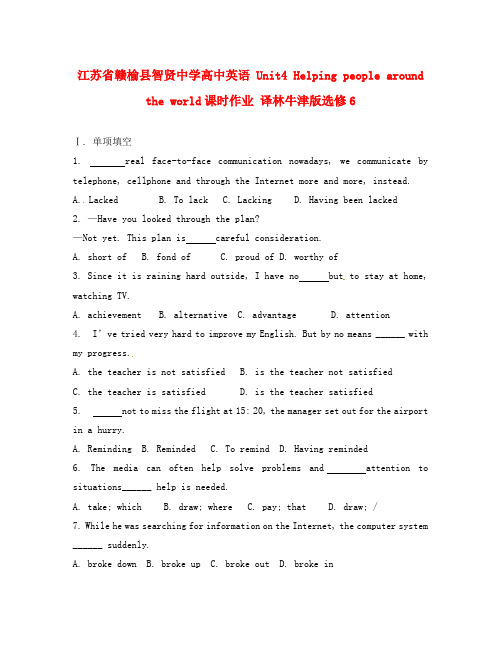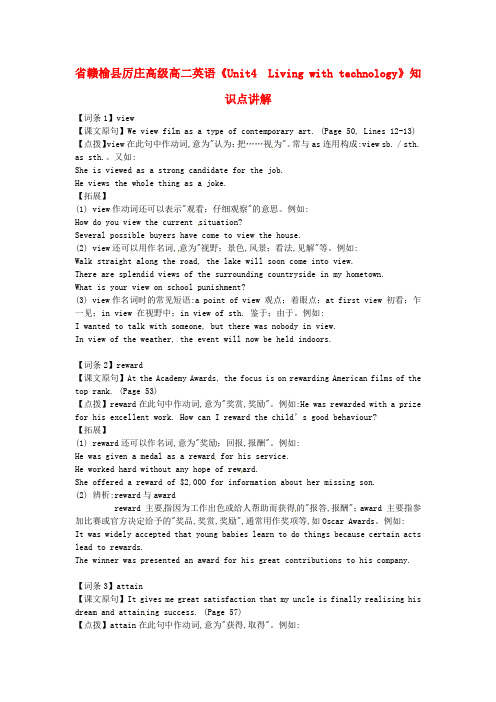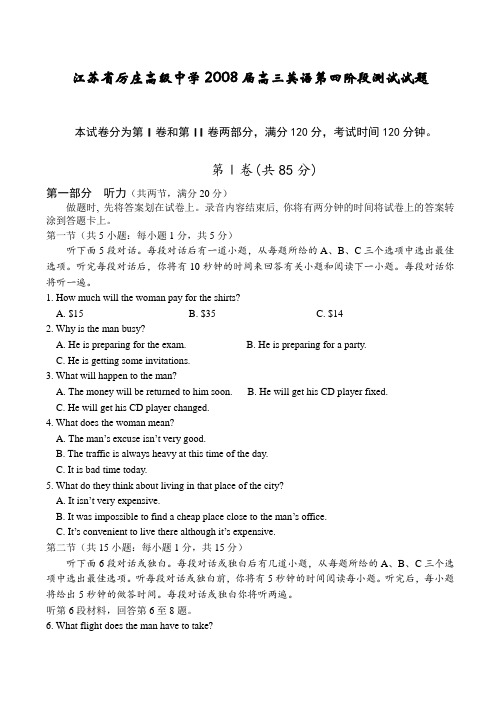江苏省赣榆县厉庄高级中学高二英语《Unit4Livingwithtechnology》导学案
江苏省赣榆县厉庄高级中学牛津译林高二英语模块九课件:U4BiblicalidiomsinEnglis

)msinLead-inDo you understand the following quotesT“敏而好学,不耻下问。
”"不耻下问”-《论语•公治长》X见义不为,无勇也。
11 "见义勇为”-《论语•为政》Confucian Analects“The punishment is to be a life for a life, an eye for an eye, a tooth for a tooth, a hand for a hand and afoot for a foot 』““OLD TESTAMENT vv 圣经•旧约>>yoLv fi NAi^urDfiv ciioitrHiousumx 湘:qg 前.-ipi | oyp COMPtETEI^NG JAMESVERJStONOtO Or N6W TWTA.MEKTLV »THE HOLY BIBLE,CONTADOXO TWE. * % OLD AND NEW TESTAMENTS,如nno wmiTHE A P 0 C R Y P II A:nASSULTtO XT Of mtg ' * ORIGINAL TONGUES,A5 I) WITH TIIE FOllMER TRANSLATIONSDILIGENTLY COMPARED AND REVISED.Ct: Cot m&rsNt ti Ut <Mnk Qttln i( f h (or it m )010,皿the Amcrimi 3ilk S>deb・ Oririuf ZUH Zditba of 1810M・r・》U:U3 W.». A»1 f M«U1I心jroTGidZ 心gyhk ;•"< ".Z & % 4Mr dy. & g “妙uc wrHw »kcf-Rcr. hVOL ・ 1.PHILADELPHIA:WILLIAM \F・ 11ARDINC,1S03.The Bible is often describedas "the greatest book ever written.H Many basic concepts and principles of Western culture have come down from the Bible. Many commonEnglish phrases and expressions have their originsin the BiblA _Can you guess the meanings of theunderlined words?1 ・ A: Oh, my God! What happened?Why are you black andblue?B: I got beaten by Peter's brother.A: Thafs a bad apple! Lefs think up away and teach him a lesson・a bad apple: 坏蛋2・ A: I think it was Jason who stole mydocument.B:Fat chance!A: He's the only one who left here late.B: I know him. Hell never do that sortof thing.Fat chance:微小的机会;极少的可能3・A: Where J s Annie?B: In the house.A: In the house? Where is she?B:Search me, I don't know whereshe is now.Search me:(非正式)不知道4. We were not expecting to see Joan. When she arrived out of the blue:wewere all surprised. (suddenly; unexpectedly)Fast readingGo through the passage as quickly as possible and try to find the answers to the following questions.7. What is an idiom ?2.Which language was the Biblefirst written in?3.Which idiom is often used todescribe children ?1. What is an idiom?An idiom is a group of words or an expression whose meaning is not straightforward, because it often can not be understood by looking at the meanings of its separate words・2. Which languages was the Bible firstwritten in?In Hebrew and Greek・3. Which idiom is often used to describechildren?"Apple of their parents9 eye'.Discuss with your partners and try to divide the text into 4 parts with the help of main ideas of each part given to you.1.What is an idiom? (Para _J ____ )2.Why does the Bible have a lot of idiom?(Para 2 )3.What are the features of Biblical idioms?(Para 3-6 )4.Why should we learn idioms well?(Para 7 )Detailed reading1. Read Para・ 1 and 2 again carefully. Answer the following T/F questions.a. The meanings of an idiom is always sameas the meanings of its componer.b. You can easily misunderstand a sentence ifyou don't recognize an idiom is being used.c. The original meaning of Biblical idiomsha ve ne ver changed.苯补2. R ead Para 3-6 carefully and answer the following questions:1) W hy did Biblical idioms often come from stories?2) What does "feet of day" mean?3) Which animals are featured in the idioms in the article ?4) Which examples included in the text are related to agricultural life or food?(1) Why did Biblical idioms often come from stories?Because the idiom itself was the expression that underlined the moral of a story and gave audiences a picture to help them understand the story better.(2) What does “feet of clay' mean? There is a hidden weakness in somebod whom we admire or respect.(3) Which animal is featured in the idiomsin the article?A calf.(4) Which examples included in the text are related to agricultural life or food? They are “reap what we sow, and "the apple of my eye\3・ Read paragraph 7 again carefully and tfyitfl 阳S 输爾j#fits of learning idioms.2) Developing a highvtQMSlIvfnsion compete nee in your _____________ __comrnunication skills3) Bette ;覚dwtandl hisf 肝 y th 「 ____________ of English-speaking countries___ a aplpreciati ng culture andsummarizeHow many idioms have been mentioned in this article? What are they?6 idioms.by and by, feet of clay, to see the handwriting on the wall, kill the fatted calf, reap what we sow and apple of their parents・Can you use them properly?Practice : Choose the correct idiom from the text to complete each sentence below・1. Debbiet father always warned her to be nice to people shedid not know, because we reap what we sow■……f her mother s eye2. Sarah's mother adores her; Sarah is ______________ .3. Wils on was disappoi nted when he learnt that the coach hadfeet of clay■4. She knew it might take a long time for her teammates tochange their minds3 but she believed that the new plan would Work by and by .5. When my brother came back home from his trip to Europe, wekilled the fatted calf■6. After his company suffered millions of dollars in losses, Joesaw the handwriting on the wall______________ and left the Company.Revision <& Consolidation Fill in the following form with proper words according to your comprehension of the text•(见学案)WritingRequirements:Write a short passage using as many idioms we have learnt in this class as possible.Homework1・Read the text again after class and underline the expressions or sentences which are not clear about.2・Try to And more idioms or Biblical idioms with the help of library or Internet ・。
江苏省赣榆县智贤中学高中英语 Unit4 Helping people around the world project教案 译林牛津版选修6

5. Where do you think the nurse works most of the time?
6. What do you think is the most difficult thing for her to do?
Para 3
1. How do they communicate?
By speaking English or French, or using acting skills.
2. What are horrible things for her?
It is quite horrible to imagine losing everything, including some of your family.
2) What dangers did she face?
Fightingin villages far from the city;looking outfor bullets and running from one place to another became way of life;waterborne diseases such as malaria and typhoid;mud and water everywhere,making it difficult to travel from place to place.
江苏省赣榆县智贤中学高中英语 Unit4 Helping people around the world project教案 译林牛津版选修6
教学
目标
Give the students a chance to practise their English by completing a project.
江苏省赣榆县智贤中学高中英语 Unit4 Helping people around the world课时作业 译林牛津版选修6

江苏省赣榆县智贤中学高中英语 Unit4 Helping people around the world课时作业译林牛津版选修6Ⅰ. 单项填空1. real face-to-face communication nowadays, we communicate by telephone, cellphone and through the Internet more and more, instead.A. LackedB. To lackC. LackingD. Having been lacked2. —Have you looked through the plan?—Not yet. This plan is careful consideration.A. short ofB. fond ofC. proud ofD. worthy of3. Since it is raining hard outside, I have no but to stay at home, watching TV.A. achievementB. alternativeC. advantageD. attention4. I’ve tried very hard to improve my English. But by no means______ with my progress.A. the teacher is not satisfiedB. is the teacher not satisfiedC. the teacher is satisfiedD. is the teacher satisfied5. not to miss the flight at 15: 20, the manager set out for the airport in a hurry.A. RemindingB. RemindedC. To remindD. Having reminded6. The media can often help solve problems and attention to situations______ help is needed.A. take; whichB. draw; whereC. pay; thatD. draw; /7. While he was searching for information on the Internet, the computer system ______ suddenly.A. broke downB. broke upC. broke outD. broke in8. —Could I borrow your Longman Dictionary?—I’d get it for you I could remember who last borrowed it.A. expect thatB. if onlyC. on condition thatD. considering whether9. There is no such a place you dream of in all this world.A. thatB. whatC. whichD. as10. (2020·吉安模拟)Schools that serve healthier food, offer nutrition education and reward students for good eating habits can make a major in preventing childhood obesity.A. mistakeB. senseC. impressionD. difference11. , Mary would not have hurt herself.A. If she listened to meB. As soon as she listened to meC. If she has listened to meD. Had she listened to me12. your timely help, I wouldn’t have finished the task on time.A. But forB. Except forC. As forD. For13. My daughter loves writing and has many articles to her school edition and even the local newspaper.A. printedB. writtenC. ContributedD. published14. Although the teacher did not mention any names, everybody knew who he was .A. referring toB. turning toC. attending toD. talking to15. Mo Yan won the Nobel Prize for Literature, famous all over the world.A. becameB. becomingC. has becomeD. to becomeⅡ. 完形填空As bu siness travelers, we expose ourselves to a wide range of environments. We think that we are always in control, but 1 in the backof our minds, we may sense that things can suddenly go very 2 . Sudden illness, violent crime, an airplane disaster, terrorism, tsunami, earthquake are all 3 .In Tucson, many 4 were saved by the immediate response of a surprising number of ordinary citizens who 5 to have been trained in basic first aid.Their 6 have been told, but I was especially taken with that of one citizen: an office worker named Anna Ballis, 7 had gone to the Safeway to buy beef and 8 crawling on the ground and saving lives before the emergency medical teams 9 . Only months earlier, Ms. Ballis had 10 a first-aid course through her work.Many companies 11 employee training in first aid. Airlines also train flight attendants in these techniques, of course. But lots of business travelers, myself 12 , who may be quite willing to help when others lie stricken, 13 lack basic first-aid skills that can make the difference between life and death in those initial(最初的)minutes14trained emergency medical responders arrive.First-aid training is simple. For years, corporations have15 employees as initial responders for in-house emergencies, and the trend is growing to 16 that business travelers also have basic skills.Obviously, when something truly horrible happens in front of you, or 17 you, Dr. Druckman said, “it’s a(n)18 to the system, and you never know how people are going to 19 . But the more training people have had, the more they have 20 what they would do in an emergency, and how they wouldd o it, the better it is. ”(293W)1. A. somewhat B. somewhereC. sometimeD. anywhere2. A. mad B. bad C. wrong D. terrible3. A. possible B. rightC. necessaryD. meaningless4. A. lives B. means C. houses D. animals5. A. managed B. thoughtC. desiredD. happened6. A. reasons B. stories C. activities D. findings7. A. whom B. what C. who D. that8. A. ended up B. set upC. built upD. kept up9. A. formed B. left C. separated D. arrived10. A. taught B. opened C. taken D. supported11. A. classify B. assumeC. announceD. offer12. A. trained B. includedC. keptD. required13. A. specially B. trulyC. generallyD. simply14. A. when B. after C. before D. until15. A. hired B. trainedC. dismissedD. abandoned16. A. explain B. introduceC. declareD. ensure17. A. to B. on C. from D. beyond18. A. shock B. pleasureC. opportunityD. method19. A. elect B. select C. react D. struggle20. A. thought B. recognizedC. rememberedD. observedⅢ. 阅读理解It’s easy to see how to help others, but what about those whose needs aren’t so obvious? This story may have happened a while back, but it was a lesson which has stayed with me and helped me ever since.It was Thanksgiving Day and I was volunteering with my parents at a shelter for the poor. We stood behind the counter dishing out hot food to whoever came in. Most of our dinners looked like they had been having hard times, their clothes old, worn and dry. In short, they looked poor!Then, a man came in, who looked anything but poor. He was well dressed, wearing an expensive suit. I wondered what he was doing there and my jaw dropped in amazement when he joined the line for food. The closer he came to my service station, the more I muttered. What was this man doing? I wanted to know. Surely he wasn’t going to take food.Then my mother quietly took me to one side. She said, “You have assu med that the needs of the people who come here must be purely physical: hunger, inadequate(不充足的)shelter and needs are emotional? What if he needs comfort, friends, or just to be among other human beings? ”Her words hit me like a ton of bricks! I felt like I should apologize to the man, but I didn’t.About a week later the shelter received a large donation from an anonymous source. I can’t help but wonder if it came from that man.Now, whenever I meet others, I remember my mother’s words and try to send kindness and blessings to them, regardless of how they look.Needs aren’t always visible. But kindness always makes a d ifference. (291W)1. The task of the author at the shelter was to .A. decide whether dinners looked poorB. learn life experience thereC. serve hot food to the poorD. help parents order dishes2. When the man waited in line, how did the author feel?A. Surprised.B. Pitiful.C. Excited.D. Angry.3. The author felt he should apologize to the man, because he .A. was asked to do so by his motherB. gave the man food much less than othersC. realized he had done something wrong to the manD. knew later that the man went there to donate4. What can we infer from the last paragraph?A. We should show others kindness whatever their needs are.B. Some needs can’t be known clearly at times.C. Needs can always be met by kindness.D. We should find out others’ needs.【语篇随练】请运用上下文暗示法, 按照以下提示题号找出完形填空中的对应词题号原文选项4 ____________________________ _________10 ____________________________ _________14 ____________________________ _________15 ____________________________ _________答案解析Ⅰ. 1. 【解析】选C。
江苏省赣榆县智贤中学高中英语Unit4Helpingpeoplearoundtheworld教案2译林牛津版选修6

学情分析
教学媒体
PPT Bb
教学过程
复备栏
Step1Important languages
spread,stretch,extend,expand
spread(-spread-spread)意为“展开;张开;传播;(使)蔓延;延 伸;扩张;涂”;
income意为“收入”,通常指一个人收入所得的钱。
用wage,salary,pay和income的适当形式填空:
①________ of $200 aweek are paid on Fridays.
②At that time Pierre Curie was teaching physics in a technical college at a small ________.
4.wage,salary,pay,income
wage一般指工人或服务人员等体力劳动者的工资、工钱,通常按时计算,分周发给,常用复数;
salary一般指机关单位官员、职员和管理人员的薪金,一般按年计算,分月发给;
pay意为“工资;薪饷”,既可指wage,也可指salary,但更多地是指军队的薪饷或津贴;
③We practise the policy of equal ________ for equal work.
④Tourism is a major source of ________ for the area.
Step3. Homework.
1.Do more exercises about what we ha ve leant.
2.Prepa re for grammar.
高中英语 Unit4 Helping people around the world grammar

(3)虚拟语气:表示动作或状态不是客观存在的事实,而是说话人的主观愿望、假设或推测等。如: If I were you,IshouldstudyEnglish.如果我是你,我就学英语了。Mayyousucceed!祝您成功!
2、表示与过去事实相反的假设和结果。如: If you had taken my advice,you wouldn't(couldn’t) have failedin theexam.如果你按照我的建议去做,你一定不会(不可能)考试不及格。
3、表示与将来事实可能相反的假设和结果。如: If it were Sunday tomorrow,Ishould (would,could,might) gotoseemy grandmother.如果明天是星期天,我就 (可能)去看望我奶奶。Ifitweretosnowthis evening, they would not go out.如果今晚下雪,他们将不出去了。
2) If youhad followedmy advice, youwould not bein trouble now.
Now, complete Part A. Pay attention to the different tenses in the if-clause and the main clause.
二、虚拟语气在条件从句中的用法
条件句有两类,一类是真实条件句,一类是虚拟条件句。如果假设的情况是有可能发生的,就是真实条件何。在这种真实条件句中的谓语用陈述语气。如: If it doesn’traintomorrow,wewill gotothepark.如果明天不下雨,我们就去公园。
江苏省赣榆县厉庄高级中学牛津高中英语选修九 Unit 4 Behind beliefs Reading 1 课件

Biblical idioms in English
Let’s revise some idioms related to colors.
The Bible is often described as "the greatest book ever written." Many basic concepts and principles of Western culture have come down from the Bible. Many common English phrases and expressions have their origins in the Bible .
Skimming
1.How is the information in the passage mainly organized ?
A. Present to past B. Cause and effect C. Examples and analysis D. More important to less important
2. the basic structure of the passage
2.Divide the text into 4 parts
structure Part 1(para. 1) Part2 (para.2) Part3(paras.3-6)
Part 4(para.7)
●de_f_in_it_io_n___of an
idiontmroduction ● _________to biblical idieoxmamsples ● _______of biblical
idioimmpsortance ● _______of idioms
(译林版):选择性必修第二册 Unit 4 Living with technology

n.喷射,涌流;喷水池;源泉,丰富来源 adj.当代的,现代的;属同时期的,同一时代的 n.同代人,同辈人 n.种子;起源,起因 n.小麦,小麦粒
速记 易学易记点
33 muscular 34 virtual 35 definition 36 headset
adj.肌肉的;强壮的 adj.虚拟的,模拟的;很接近的,事实上的 n.定义;释义,解释 n.耳机
速记 易学易记点
43 initial 44 weed 45 state-of-the-art
adj.最初的,开始的 n.首字母 n.杂草,野草
adj.使用最先进技术(或方法)的, 最先进的
速记 易学易记点
46 satellite 47 expense 48 gender 49 pub
n.人造卫星;卫星 n.费用;开销;开支 n.性别 n.酒吧,酒馆
速记 易学易记点
50 finance
n.财政,金融;资金;财力,财务管理vt.提供资金
→financial adj.财政的;金融的;资金的
速记 易学易记点
51 threaten
vt.危及,对……构成威胁;威胁,
恐吓
→threat
n.构成威胁的人(或事物);威胁,恐
吓;凶兆
·threaten sb with sth 用……威胁某人
n.数据库 n.黑客 n.偷窃,偷窃罪 adj.有自动保险装置的,具有自动防止故障性能的 n.无人驾驶飞机
速记 易学易记点
20 decrease
·decrease/increase by... decrease/increase to... ·on the decrease/decline on the increase/rise
江苏省赣榆县厉庄高级中学牛津译林版高二英语模块九学案:U4 Biblical idioms in English句子结构与划分

模块九Unit4 句子成分;简单句、并列句和复合句一、句子成分(一)句子成分的定义:构成句子的各个部分叫做句子成分。
句子成分有主要成分和次要成分;主要成分有主语和谓语;次要成分有表语、宾语、定语、状语、补足语和同位语。
(二)主语:主语是一个句子所叙述的主体,一般位于句首。
但在there be结构、疑问句(当主语不疑问词时)和倒装句中,主语位于谓语、助动词或情态动词后面。
主语可由名词、代词、数词、不定式、动名词、名词化的形容词和主语从句等表示。
例如:During the 1990s, American country music has become more and more popular. (名词)We often speak English in class. (代词)One-third of the students in this class are girls. (数词)To swim in the river is a great pleasure. (不定式)Smoking does harm to the health. (动名词)The rich should help the poor. (名词化的形容词)When we are going to have an English test has not been decided. (主语从句)That we will fail if we don’t word hard is a true fact. (主语从句)It is necessary to master a foreign language. (it作形式主语,真正的主语为后面的不定式) It is strange that many people don’t like milk. (it作形式主语,真正的主语为后面的that 从句)(三)主语补足语被动语态后面的补足语称作主语补足语。
(整理版高中英语)赣榆县厉庄高级高二英语《Unit4Livingwith

省赣榆县厉庄高级高二英语《Unit4 Living with technology》知识点讲解【词条1】view【课文原句】We view film as a type of contemporary art. (Page 50, Lines 12-13) 【点拨】view在此句中作动词,意为"认为;把……视为"。
常与as连用构成:view sb. / sth. as sth.。
又如:She is viewed as a strong candidate for the job.He views the whole thing as a joke.【拓展】(1) view作动词还可以表示"观看;仔细观察"的意思。
例如:How do you view the current situation?Several possible buyers have come to view the house.(2) view还可以用作名词,意为"视野;景色,风景;看法,见解"等。
例如:Walk straight along the road, the lake will soon come into view.There are splendid views of the surrounding countryside in my hometown.What is your view on school punishment?(3) view作名词时的常见短语:a point of view 观点;着眼点;at first view 初看;乍一见;in view 在视野中;in view of sth. 鉴于;由于。
例如:I wanted to talk with someone, but there was nobody in view.In view of the weather, the event will now be held indoors.【词条2】reward【课文原句】At the Academy Awards, the focus is on rewarding American films of the top rank. (Page 53)【点拨】reward在此句中作动词,意为"奖赏,奖励"。
江苏省赣榆县智贤中学高中英语 Unit4 Helping people around the world教案1 译林牛津版选修6

Module8 Unit3: Revision(I)教学目标1. Encourage students to grasp the topic sentence of each paragraph.2. Students are expected to gain some knowledge about some famous art muse umsand pai nters and enhance their reading comprehension.3. Deve lop students’ reading ability-how to read a life story or biography.教学重点1. How to help students to find the topic sentence in each paragraph.2. How to help students to understand the text.教学难点1. How to help students to find the topic sentence in each paragraph.2. How to help students to understand the text.学情分析教学媒体PPT Bb教学过程复备栏Step1 【单词】1. I am pleased to have this chance today to talk to you aboutthe United Nations of the UN, as it is more often referred to.refer to…提到;说到;涉及到;向…查询信息;与…有关, 关系到…;When I said someone was stupid, I wasn’t referring to you.我说有的人很蠢并不是指你。
We often refer to New York as Big Apple.我们常把纽约称为大苹果。
江苏省赣榆县智贤中学高中英语Unit4Helpingpeoplearoundtheworldreading教案1译林牛津版选修6

学情分析
学生对人体的器官的英文单词缺乏了解,本课时涉及到的学习内容恰恰满足学生结合生活实际的需要
教学媒体
Multy-media&Blackboard
教学过程
复备栏
1.Lead-in Start the class with the following questions:
Have you ever thought about the future?
江苏省厉庄高级中学高三英语第四阶段测试试题

江苏省厉庄高级中学2008届高三英语第四阶段测试试题本试卷分为第I卷和第II卷两部分,满分120分,考试时间120分钟。
第Ⅰ卷(共85分)第一部分听力(共两节,满分20分)做题时, 先将答案划在试卷上。
录音内容结束后, 你将有两分钟的时间将试卷上的答案转涂到答题卡上。
第一节(共5小题:每小题1分,共5分)听下面5段对话。
每段对话后有一道小题,从每题所给的A、B、C三个选项中选出最佳选项。
听完每段对话后,你将有10秒钟的时间来回答有关小题和阅读下一小题。
每段对话你将听一遍。
1. How much will the woman pay for the shirts?A. $15B. $35C. $142. Why is the man busy?A. He is preparing for the exam.B. He is preparing for a party.C. He is getting some invitations.3. What will happen to the man?A. The money will be returned to him soon.B. He will get his CD player fixed.C. He will get his CD player changed.4. What does the woman mean?A. The man’s excuse isn’t very good.B. The traffic is always heavy at this time of the day.C. It is bad time today.5. What do they think about living in that place of the city?A. It isn’t very expensive.B. It was impossible to find a cheap place close to the man’s office.C. It’s convenient to live there although it’s expensive.第二节(共15小题:每小题1分,共15分)听下面6段对话或独白。
- 1、下载文档前请自行甄别文档内容的完整性,平台不提供额外的编辑、内容补充、找答案等附加服务。
- 2、"仅部分预览"的文档,不可在线预览部分如存在完整性等问题,可反馈申请退款(可完整预览的文档不适用该条件!)。
- 3、如文档侵犯您的权益,请联系客服反馈,我们会尽快为您处理(人工客服工作时间:9:00-18:30)。
江苏省赣榆县厉庄高级中学高二英语《Unit4 Living withtechnology》导学案Project (Period 2: Language)Learning aims(学习目标):1.Learn to improve the ability of reading.2.Master the usages of important words.Learning procedures(学习过程):考点探究:1.sensitive: a.(灵敏的,敏感的):Some p eople's teeth are highly sensitive to cold. 相关短语:be sensi tive to(about) (对..敏感)/ be sensitive about (介意,在乎)/be sensibleof (察觉到)sensible( a.感觉的到/明智的/实用的)/sensational(adj.轰动的/令人感动的/非常好的/耸人听闻的)e.g.: The elderly need special care in wi nter, as they are ________ to the sudden changesof weather.A. sensitiveB. sensibleC. f lexibleD. positive2.suspect :vt. (怀疑,猜疑,疑心,觉得,以为)/n.(嫌疑犯)/a. (可疑的)相关短语:suspect that(怀疑..)suspect sb. of doing(怀疑谁做某事)/suspect sb. of (怀疑谁有..嫌疑)e.g.:1)I ___________her____________.(我怀疑她的动机)2)He is ____________of____________.(他有杀人嫌疑)归纳拓展:suspicious(a.感觉可疑的,不信任的),常用于“be suspicious of (about)(对..怀疑)/above(beyond) suspicious (无可置疑)/under suspicious(涉嫌)/look(sound)suspicious (听上去可疑)”3.contrary:n.(反面,pl.对立面): Cruelty is the contrary of kind ness. (残忍是仁慈的反面) 相关短语:on the contrary (相反)/to the contrary(与…相反)/be contrary to (相反的)e.g.: 1)He passed the exam,__________________________________ (和我预料的情况相反)2)You must be tired. On the contrary, I feel wide awake.a. (opposite 相反/别扭的/固执的)e.g.:Mrs. Smith is too _________to make friends (史密斯太太过于固执而不易交朋友)4. possess : v. (拥有/占有)e.g.: 1)I don't poss ess a sin gle DVD (= I don't have even one DVD)possession:n. [U] (占有)e.g.:1)The possession of large amounts of money does not ensure happiness.相关短语:in possession of sth.(拥有,占有)/in the possession of sth.(= in one’spossession 被..占有)/have(take)possession of sth.(拥有)/have sth. inone’s possession(拥有)即学即练:-Does the young man standing there _________ the company?-No. T he company is _________ his father.A. in possession of; in the possession ofB.have possession of; in the possession ofC. take possession of; in possession ofD. have possession of; inpossession of5.contradict:vt.(与..矛盾)相关短语:contradict oneself(自相矛盾)/contradict with..(与..相矛盾)/in contradict to (with)(与..相矛盾)/contradict sb.(顶撞谁)/contradict ..between and ..(..和..相矛盾)归纳:contradiction(n.矛盾/不一致)/contradictory(a.相互矛盾的)/contradictable(a.可反驳的)/contradictor(n.反驳者)e.g.:Your behavior is ____ ___________ _______the principles.(你的行为和你的原则相矛盾)plain :vi. (抱怨;控诉;抗议,常与of,about连用)complaint:n. (抱怨)e.g.:1)She is always ___________ ________ _____________. (她总是怨天尤人)7.te ndency:n. (倾向,趋势,癖好,脾性,后跟to/toward)e.g.:The tendency is toward higher prices.(物价趋向于上涨)辨析:tendency, trend and drifta.tendency(指向某一方向移动或在确定的趋向中行动),相关短语:have a tendency tod o(有..倾向)/tend to do(倾向于做)b.trend (总的趋向或倾向),e.g.: a recent trend in literature(文学的最近倾向)c.drift (事情进行的趋势或动向),e.g.:The drift of opinion was against war.(舆论的趋势是反对战争。
)8.give thought to(思考) thoughtful :a(细心的,体贴的)相关短语:have a thought of (有..的打算/突然想起)/be lost/deep in thought (陷入沉思)/on second thoughts(转念一想)/without a second thought(立即)/That’s a thought.(那是一个好主意)/thought of..as..(看待)/ thought for..(对..的体谅/关怀) e.g.:1) I have been __________ a lot of__________ to your__________.(我一直在认真考虑你的建议)2) She was staring into the sky,______________________________.(她凝望着天,陷入沉思)9.more A than B:(比..更.. /与其..倒不如..,A和B可以是名词/形容词/分词/不定式)1)“多于”:The stone weighs more than 10 tons.2)“不止是,非常,岂止”: Jack is more than my friend. _______I am more than co ntent with what you said .________3) “more than one+ n.作主语时,谓语动词用单数” :More than one factory has been closed.相关短语:no nore than(仅仅/只不过)/no more..than(和..一样不)/not more than(不超过)/not more ..than(没有..那样..)/more than ever(更加)/more than a little(非常)/more often than not(通常)/nothing more than(和..完全一样)/neither nore or lessthan(不多不少)/more than(多余/超过)e.g.: This book seems to________________________________________________________.(这本书与其说是一本语法书倒不如说是一本词典)练习:1. We s______________they'll be a little late. suspect2. What you have done is ______________(相反)to the doctor's orders.contrary3. In the past the root of this plant was thought to ______________magical powerswhich could cure baldness. possess4. The boy c_____________of a pain in his stomach. complained5.He was particularly _____________(敏感的)to criticism. SensitiveThe l ayout on Bb:教后札记:______________________________________________________________。
